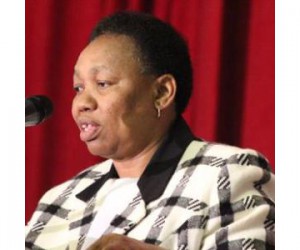The latest development to the annual lekgotla of the African National Congress's national executive committee was that, last week, they effectively repudiated a statement by president Zuma that the late Dr. Hendrik Verwoerd was to blame for the textbook chaos.
Without referring to what Mr. Zuma said, the NEC stated that “The NEC ... considered the lack of delivery of books in Limpopo as shocking and unacceptable and believes that whomsoever is found to be responsible must face stern action that may include criminal charges. The NEC acknowledged that this is a serious failure on the part of government, the department of education in particular at both national and provincial level.” (Our emphasis).
Last month, Justice Minister, Jeff Radebe, called the non-delivery of textbooks to Limpopo schools a "national shame".
With mounting calls for the minister of basic education, Angie Motshekga, to either resign or be fired by president Zuma, it is becoming increasingly unlikely that she will survive the storm.
The ANC’s Youth League (ANCYL) and the ANC-aligned Congress of South African Students (Cosas) have become the latest organisations to call for her removal.
In a statement last week, the ANCYL said, “Given the inability of our deployed cadre (Motshekga) to protect our future and the aspiration to open the doors of learning and teaching, we call on Minister Angie Motshekga to do the noble thing and resign from her position.
“An apology to the nation for failing the young people of Limpopo is also expected. We must never take our people for granted. We trust that the person who takes over her responsibility will be an individual who is decisive and truly committed to education.”
In its statement on the matter, Cosas also called for her removal as minister responsible for basic education.
“We want to place it on record that she is not the only one to blame for the unacceptable situation in Limpopo and the rest of the country by the way.
“In all honesty the future does not look very bright from where we are standing and decisive leadership is needed from those that are charged with the responsibility to rescue the students of South Africa. That is the basis for our call to President Jacob Zuma to kindly relieve the Minister of basic education from her duties immediately,” the statement read.
And it is not only in Limpopo that there have been problems with textbooks. In the Eastern Cape the provincial education department - which is under administration - took over the ordering of textbooks after Section 21 schools defaulted on payments to service providers, leaving it with a bill of more than R120 million. This is not only now the subject of court action brought by some of the suppliers of books but some schools had to return books when Xhosa pupils were sent Sotho workbooks, while Afrikaans and English-speaking pupils received Xhosa workbooks.
To further muddy the waters, there are no less than three separate official inquiries into the Limpopo saga running at the same time.
Even in the Democratic Alliance-governed Western Cape Province there are problems brewing around the school system. Cosatu's Western Cape branch has served the provincial government with notice over plans to close some dysfunctional schools.
In a letter to premier Helen Zille and the MEC for education, Donald Grant, Cosatu’s Tony Ehrenreich writes, “We will not allow you to treat our kids in this manner as you try and maintain and legitimise the apartheid generational advantage of the wealthy white people in this province. We are lodging the attached section 77 application at Nedlac, and hope that in the engagements that must follow through Nedlac we can find mutually beneficial solutions to the closures and equality in education.”
Ominously, ex-minister of health, Barbara Hogan, speaking at non-governmental organisation Equal Education's national conference last week, urged young people to mobilise and "start holding government accountable".
The 1976 Soweto uprising by learners, which was an important landmark in the fight against apartheid, showed pupils' strength, she said.
In an interview with the writer four years ago, a prominent business leader and member of the ANC’s NEC, aired the need for a non-partisan national conference on education similar to the one held in 1939 by Afrikaans cultural organisations.
It would seem that the need for an intervention to de-politicise education and turn the tide of decline around is now more urgent than ever.






